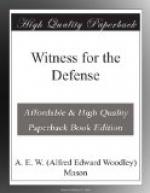On the Saturday morning Mr. Hazlewood drove over early to Great Beeding. His impatience had so grown during the last few days that his very sleep was broken at night and in the daytime he could not keep still. The news of Dick’s engagement to Stella Ballantyne was now known throughout the countryside and the blame for it was laid upon Harold Hazlewood’s shoulders. For blame was the general note, blame and chagrin. A few bold and kindly spirits went at once to see Stella; a good many more seriously and at great length debated over their tea-tables whether they should call after the marriage. But on the whole the verdict was an indignant No. Disgrace was being brought upon the neighbourhood. Little Beeding would be impossible. Dick Hazlewood only laughed at the constraint of his acquaintances, and when three of them crossed the road hurriedly in Great Beeding to avoid Stella and himself he said good-humouredly:
“They are like an ill-trained company of bad soldiers. Let one of them break from the ranks and they’ll all stream away so as not to be left behind. You’ll see, Stella. One of them will come and the rest will tumble over one another to get into your drawing-room.”
How much he believed of what he said Stella did not inquire. She had a gift of silence. She just walked a little nearer to him and smiled, lest any should think she had noticed the slight. The one man, in a word, who showed signs of wear and tear was Mr. Hazlewood himself. So keen was his distress that he had no fear of his sister’s sarcasms.
“I—think of it!” he exclaimed in a piteous bewilderment, “actually I have become sensitive to public opinion,” and Mrs. Pettifer forbore from the comments which she very much longed to make. She was in the study when Harold Hazlewood was shown in, and Pettifer had bidden her to stay.
“Margaret knows that I have been reading these reports,” he said. “Sit down, Hazlewood, and I’ll tell you what I think.”
Mr. Hazlewood took a seat facing the garden with its old red brick wall, on which a purple clematis was growing.
“You have formed an opinion then, Robert?”
“One.”
“What is it?” he asked eagerly.
Robert Pettifer clapped the palm of his hand down upon the cuttings from the newspapers which lay before him on his desk.
“This—no other verdict could possibly have been given by the jury. On the evidence produced at the trial in Bombay Mrs. Ballantyne was properly and inevitably acquitted.”
“Robert!” exclaimed his wife. She too had been hoping for the contrary opinion. As for Hazlewood himself the sunlight seemed to die off that garden. He drew his hand across his forehead. He half rose to go when again Robert Pettifer spoke.
“And yet,” he said slowly, “I am not satisfied.”
Harold Hazlewood sat down again. Mrs. Pettifer drew a breath of relief.
“The chief witness for the defence, the witness whose evidence made the acquittal certain, was a man I know—a barrister called Thresk.”




